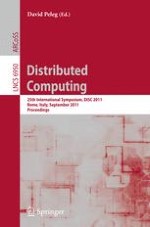2011 | OriginalPaper | Buchkapitel
Byzantine Agreement Using Partial Authentication
verfasst von : Piyush Bansal, Prasant Gopal, Anuj Gupta, Kannan Srinathan, Pranav Kumar Vasishta
Erschienen in: Distributed Computing
Verlag: Springer Berlin Heidelberg
Aktivieren Sie unsere intelligente Suche, um passende Fachinhalte oder Patente zu finden.
Wählen Sie Textabschnitte aus um mit Künstlicher Intelligenz passenden Patente zu finden. powered by
Markieren Sie Textabschnitte, um KI-gestützt weitere passende Inhalte zu finden. powered by
Three decades ago, Pease
et al.
introduced the problem of
Byzantine Agreement
[PSL 80] where nodes need to maintain a consistent view of the world in spite of the challenge posed by Byzantine faults. Subsequently, it is well known that Byzantine agreement over a completely connected synchronous network of
n
nodes tolerating up to
t
faults is (efficiently) possible if and only if
t
<
n
/3. Pease
et al.
further empowered the nodes with the ability to authenticate themselves and their messages and proved that agreement in this new model (popularly known as authenticated Byzantine agreement (ABA)) is possible if and only if
t
<
n
. (which is a huge improvement over the bound of
t
<
n
/3 in the absence of authentication for the same functionality).
To understand the utility, potential and limitations of using authentication in distributed protocols for agreement, Gupta
et al.
[GGBS10] studied ABA in new light. They generalize the existing models and thus, attempt to give a unified theory of agreements over the authenticated and non-authenticated domains. In this paper we extend their results to synchronous (undirected) networks and give a complete characterization of agreement protocols.
As a corollary, we show that agreement can be
strictly
easier than all-pair point-to-point communication. It is well known that in a synchronous network over
n
nodes of which up to any
t
are corrupted by a Byzantine adversary, BA is possible only if all pair point-to-point reliable communication is possible [Dol82, DDWY93]. Thus, a folklore in the area is that maintaining
global
consistency (agreement) is at least as hard as the problem of all pair
point-to-point
communication. Equivalently, it is widely believed that protocols for BA over incomplete networks exist only if it is possible to simulate an overlay-ed complete network. Surprisingly, we show that the folklore is not always true. Thus, it seems that agreement protocols may be more fundamental to distributed computing than reliable communication.
